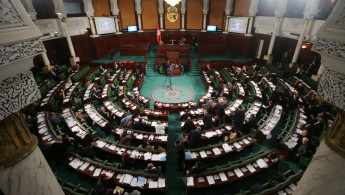Tunisia parties slam president's decision to dissolve parliament
Tunisian MPs Monday strongly denounced President Kais Saied's decision to suspend parliament, calling on the army and security forces to remain neutral in the political crisis.
In a statement released by parliament after Saied's decision on Sunday to sack Prime Minister Hichem Mechichi and suspend the democratic process, legislators voiced their "absolute rejection and strong condemnation" of the decision.
It held Saied fully responsible for all the moral and legal consequences of the move.
The Tunisian legislators called on the military and police to "preserve state institutions… and not be subject to any orders outside the spirit of the constitution and the rule of law".
The parliament also renewed its confidence in the cabinet, led by the now-ousted Mechichi.
Assembly bureau considers the President’s activation of Article 80 a grave abuse and misinterpretation in addition to the clear manipulation and deception in claiming the Assembly speaker’s approval of these measures.#Tunisia
— Ennahdha Party (@EnnahdhaParty) July 26, 2021
Saied's decision comes after a prolonged period of deadlock between him, Mechichi, and the parliament, which has crippled management of the coronavirus crisis and seen Tunisia have one of the highest per-capita death rates in the world.
An Algerian journalist covering recent developments in Tunisia told The New Arab that Saied was "capitalising on the anti-Ennahdha mood currently sweeping Tunisia" and considering the president’s move as "unnecessary".
"This bold and unnecessary move allows him to present himself as a firm leader who does not shy away from tough decisions. He could have dissolved parliament and called for new elections, but went one step further," she said.
She believed the move will appeal to former nostalgics of former dictator Zine El-Abidine Ben Ali "who don’t believe in any appeasement with Islamists", in reference to Ennadhda, the country's largest political party.
"Short term strategy is effective, but in the mid to long-term this will increase resentment among more conservative voters."
Supporters of Ennahdha gathered outside parliament Monday morning in protest at the "coup".
The demonstrators called for the restoration of democracy amid a heavy security presence, urging the president to follow the democratic traditions since the 2011 revolution.
Parliament Speaker Rached Ghannouchi was denied access to his office by the army, which has continued to seal off entry to parliament.
He left after crowds hurled stones at his convoy.
The Tunisian General Labor Union - the largest trade union organisation in the country - neither condemned nor condoned Saied's decision after meeting with him, taking a neutral stance.
Local media outlets described this position as "blurry" as the union called for "guarantees" from the president after his "extraordinary measures."
The union expressed its rejection of any party resorting to violence, stressing the need to find a "peaceful exit from this delicate and difficult stage."
The International Union of Muslim Scholars issued a fatwa - an Islamic edict - prohibiting attacks on the choice of the Tunisian people who voted for Ennahdha.
Secretary-general of the union, Ali Mohieddine Al-Qaradaghi, announced on Monday his rejection of any "coup" in Tunisia.
"We are against any coup, even if it is carried out by an Islamic group. Our legitimate position is clear," he said on Twitter.
Tunisians carried out mass protests across the country on Sunday just hours before Saied announced he was suspending parliament and dismissed Prime Minister Mechichi.
Some of those protests saw scuffles between supporters and opponents of Islamist-inspired Ennahdha, Tunisia’s largest political party.





 Follow the Middle East's top stories in English at The New Arab on Google News
Follow the Middle East's top stories in English at The New Arab on Google News


